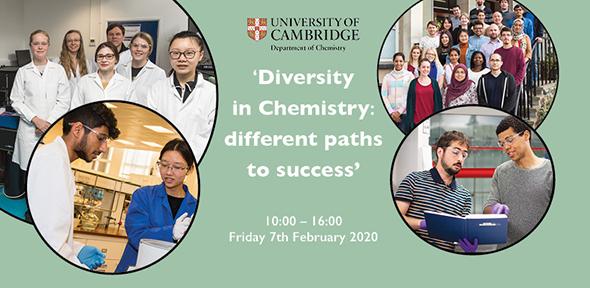
Alumni joined members of the department, guests from industry and speakers from UK Research and Innovation, the Royal Society of Chemistry, the Proud Science Alliance and the BBC World Service, to explore issues around diversity in chemistry.
Following a very popular alumni event last year themed around 'Women in Chemistry', this year we widened the topic and discussed the factors hindering the recruitment and retention of under-represented groups in Chemistry more broadly.
At the event in February 2020, Conference Chair Professor Melinda Duer pointed out: "After our 'Women in Chemistry' event last year, attendees said: 'Great event. Now, what about all the other groups that face unwarranted challenges in achieving success in Chemistry?'
So that's how we came to today, where we aim not only to celebrate diversity in Chemistry but also to understand how to take down the barriers that impede success, in particular for minority groups."
She added: "There is now increasing evidence that diversity amongst the people who are doing science promotes new research directions and greater understanding through the same scientific problem being seen from multiple perspectives."
During the course of the day, an array of speakers, panellists and workshop presenters discussed reasons why scientists from under-represented groups still struggle to be included in the research lab. Speakers talked about how unconscious bias and traditional attitudes to what constitutes scientific 'success' are proving stubbornly hard to alter.
"Unpicking all the factors that contribute to our view of science - and the true impact of the human biases that damage it and its practitioners - is a hugely complex problem," Melinda added. "So today we're focusing on two key aspects: how bias and prejudice affects scientific careers through the environment in the workplace, and through scientific publication."
Speakers came from organisations including the research councils' umbrella body UK Research and Innovation, and from scientific publishers Cambridge University Press.
At the morning panel session, scientific journal publisher Fiona Hutton talked about her new journal Experimental Results. A former cancer research scientist, she has launched this new Cambridge University Press publication to tackle the crisis in the reproducibility of results and provide an outlet for standalone research that currently goes unpublished.
She says: "I've had countless conversations with scientists about the value of publishing all valid experiments, not just those that fit the narrative of a particular paper or which are deemed to have a high impact."
There were also speakers from AstraZeneca, the Royal Society of Chemistry, and the controller of BBC World Service English who came to give examples of what organisations in other fields were doing to increase the representation of minority groups in leadership.
There were also small-group workshops on topics ranging from overcoming 'imposter syndrome' to challenging the boundaries between science and art.
The day was considered to be a great success, not only bringing alumni back to the department, but also helping to bring positive change to departmental culture.
To that end, we are already planning our next event to take place in February 2020. See the sidebar, right, for details.
